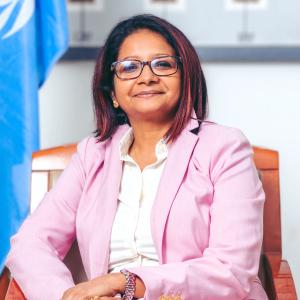It is with immense gratitude that I address you today at this pivotal event—the three-day peer-to-peer learning and capacity-building workshop, bringing together 15 Commonwealth countries from Africa until the 3rd of October at this workshop in Dar es Salaam.
I would like to extend my heartfelt appreciation to the co-organizers of this workshop: the Commonwealth Secretariat’s Human Rights Unit and the United Nations Office of the High Commissioner for Human Rights (OHCHR). I also warmly welcome all the delegates and representatives from the National Statistical Offices, National SDG taskforces, and line ministries from the participating Commonwealth countries.
The issues to be addressed are of vital importance. The reality we face in today’s world is recently described by the UN High Commissioner for Human Rights in these somber words: ‘We are going backwards, inequalities are skyrocketing, climate change is burning and pounding our planet, and the number of people living in severe poverty has risen, for the first time in a generation. The system is broken.’ (Volker Türk, Sixth Intersessional Meeting of the Human Rights Council on human rights and the 2030 Agenda (18 January 2024). As part of the fix to this broken system, we have to ensure that human rights is ensured for all people on this planet…and not just in an abstract/normative way but in living/breathing/day to day terms.
The NMIRFs (or ‘national mechanisms’) are the international community’s powerful new tool to finally bridge the long-standing ‘implementation gap’ between universal human rights norms and local realities. Therefore, robust national mechanisms will improve the ability of States to implement the recommendations they receive from the three main UN human rights mechanisms (Special Procedures, Treaty Bodies, and the UPR), thereby bringing national laws, policies, and practices into ever greater alignment with their obligations under international human rights law. By strengthening national mechanisms, we are promoting accountability, transparency, participation, inclusion and the rule of law. These are fundamental to furthering the realization of human rights and achieving peace, achieving the SDGs, promoting sustainable development and justice in our societies.
Throughout these 3 days, we will be privileged to hear experiences and lessons learned from around the different regions of Africa, reflecting a diversity of approaches.
The UN system certainly plays a critical role in consolidating awareness of these converging human rights and development agendas and in building bridges between entities responsible for implementing and monitoring human rights and the SDGs. These synergies will facilitate governments’ efforts to implement human rights recommendations and ensure they are better integrated in the work of Ministries of planning and the sectoral policies of line ministries. National mechanisms and SDG coordinating bodies also have the potential to build “national ownership” of human rights recommendations by facilitating intersectoral and multi-stakeholder dialogues on human rights challenges and policy responses.
Dear participants, your presence here reaffirms our collective commitment to enhancing the capacity of national mechanisms for implementation, reporting and follow-up of human rights obligations and recommendations to play this fundamental transformative role.
On behalf of the UN Country Team in Tanzania, it is my pleasure to warmly welcome you all to Tanzania—Karibuni sana.
I also would like to thank the Government of the United Republic of Tanzania for hosting this event. This is an indication of your commitment to engage with the UN human rights mechanisms and to continue supporting learning and exchanges in the region.
The United Nations in Tanzania is currently supporting the government in drafting pending reports under several treaties, such as the CEDAW Convention, the International Covenant on Economic, Social and Cultural Rights, the International Covenant on Civil and Political Rights, and the Convention on the Rights of Persons with Disabilities (CRPD), among others. The UN family pledges its continued support to ensure these reports are completed and submitted in a timely manner.
We also continue to partner with key national stakeholders to support the National Statistics Office on data generation for evidence-based planning and decision-making, as well as the National SDG Taskforce in drafting the 2023 Voluntary National Review (VNR) report and, as we will see in the next two days, for human rights reporting.
Excellencies, Ladies and Gentlemen,
As we move forward, I reaffirm the United Nations’ readiness to continue supporting and strengthening our partnership with Tanzania as with the Governments represented in this workshop. I am confident that the discussions over the next two days will allow us to identify transformative strategies to address reporting backlogs, share best practices, and foster deeper collaboration across the continent.
In closing, I encourage your active participation as we work together to enhance our collective skills and knowledge. Let us make the most of this gathering to build stronger partnerships, tackle challenges together, and advance our commitment to human rights, which will in turn accelerate the achievement of the Sustainable Development Goals (SDGs) “leaving no one behind”.
Once again, I wish you all a productive and successful workshop.
Asanteni sana!






